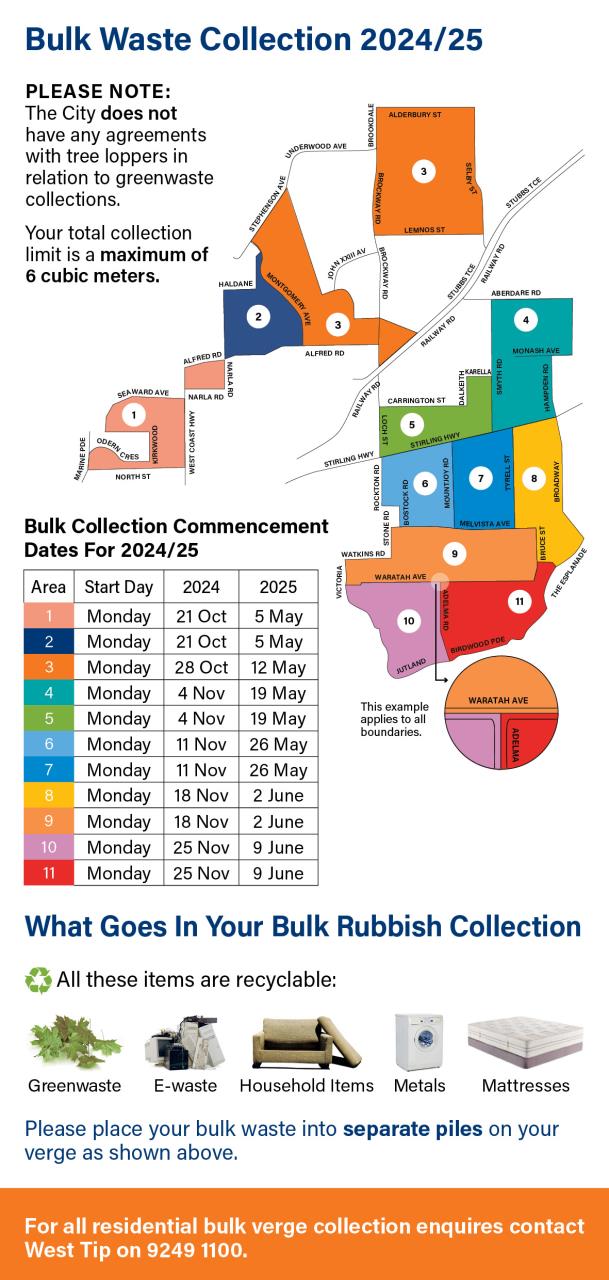Bulk Waste Collection and Drop-Off
West Metropolitan Regional Council (WMRC)
The Western Metropolitan Regional Council (WMRC) is a local government organisation that provides specialist waste management services for its Member and Participating Councils. These include waste transfer, community waste treatment and recycling, and waste education and promotion services.
The City of Nedlands is a participating council of the WMRC, which means that local residents can drop-off domestic quantities of many waste items that cannot be disposed of in your kerbside waste bins.
These are some of the common items that can be dropped off for FREE
- Batteries – domestic or car
- Household hazardous waste – acids, aerosols, gas cylinders, chemicals, etc.
- Cardboard
- Polystyrene
- Oil – cooking or mechanical waste
- Clothing, textiles/fabrics, and shoes
These are some of the waste items that can be dropped off for a fee
- Asbestos
- Construction and demolition waste
- Tyres
Download the WMRC Info Sheet
The WMRC Recycling Centre Location and Opening Hours
60 Lemnos St, Shenton Park WA 6008, enter from Brockway Road
Monday – Friday: 7:30am to 4.00pm
Saturday & Sunday: 8.00am to 4.00pm
Public Holidays: 7.30am to 2.00pm
(Closed Christmas Day, Good Friday & New Year’s Day)
Contactable by phone between 8:30am and 4:30pm on 9384 6711
For more information about the WMRC visit https://www.wmrc.wa.gov.au/
Bulk Waste Verge Collection

The City provides two bulk waste collections each financial year. This collection enables you to place hard waste, greenwaste, mattresses, metal and e-waste on the verge for collection.
Did you know that more than 75% of all bulk verge waste from the City is recycled?
Place your materials out for collection as specified to ensure public safety and the prevention of property damage. Your waste will not be collected it if doesn't conform with bulk collection conditions or is placed out after the scheduled collection date.
Any waste placed out after the scheduled collection date may be considered an offence under the Litter Act 1979 and households may face a penalty of up to $5,000. For more information about litter and illegal dumping please click here.
Things to note
- Bulk rubbish is not to be placed on reserves, vacant land, parks, median strips or driveways.
- Bulk rubbish must not be placed on verges more than seven days before your collections (penalties apply).
- Ensure your bulk collection materials are not more than a total of 3 cubic metres of hard waste and 3 cubic metres of green waste.
- Place your bulk rubbish on your verge before 6am on the Monday of your collection week.
- Check that pedestrians, cyclists and motorists still have clear visibility from the road. Keep rubbish 1m clear of sprinklers, water meters, power poles and street signs to avoid any damage during the collection process.
- Keep rubbish clear of the footpath and place it only on the verge adjacent to your property.
- Household items, greenwaste, metals, electronic waste (e-waste) and mattresses are to be placed in separate piles.
- Bulk rubbish is collected by machinery. Please place rubbish away from sprinklers, lights and wall and flower beds to avoid damage.
- Please note that The City does not have any agreements or relationships with tree loppers, or any other contractor, in relation to greenwaste collections.
What goes in your bulk verge collection
Please place your bulk waste into five separate piles on your verge.

What will be collected
- Household furniture
- White goods and metal products including de-gassed fridges, stoves, dryers, freezers and washing machines (doors removed or taped)
- E-waste such as televisions and computers
- Prunings less than 1.5m in length and 10cm in diameter with cut ends toward the street
- Small loose greenwaste placed in the City's reusable greenwaste bags
- Household electric items
- Unwanted household items
- Mattresses
- Trampolines (dismantled)
What will not be collected
- All glass and mirrors, including showers, screens, windows, doors and glass tabletops
- Tree trunks, lawn sods and soil
- Food waste
- Building materials, including rubble, bricks, paving, tiles, concrete, gravel, glass, hardiflex and supersix fencing
- Asbestos cement products
- Motor parts, including tyres
- Gas cylinders
- Hazardous waste, including paints, oils and chemicals
- Solar panels
- Broken television screens
- Medical waste
- Non degassed fridges
- Car batteries
- Polystyrene balls (including bean bags)